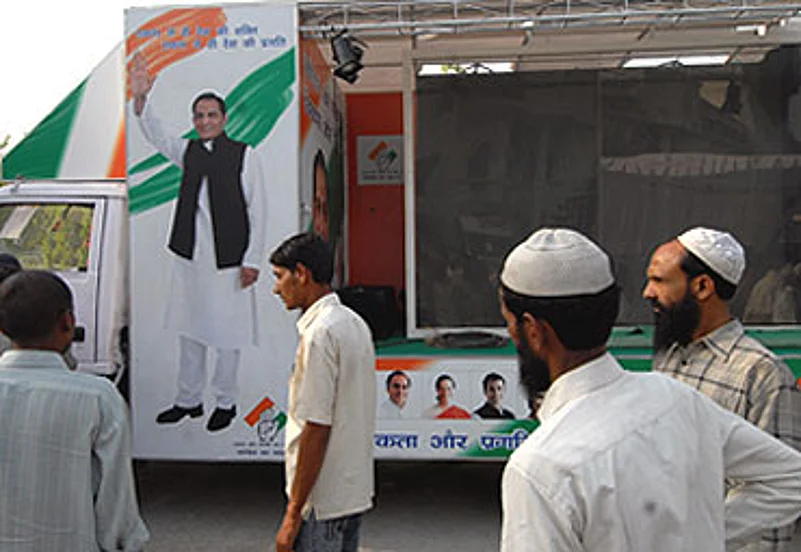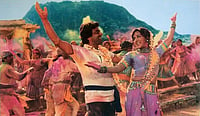
Just as Azhar was about to leave Malik's constituency to head back to Moradabad, his agent called to say that I could climb aboard the Endeavour and interview him. Is it a cover story? he asked. I prudently said that I didn't know. Cover stories were bigger than inside stories and size mattered to Azhar. "These small television channels keep asking for interviews. That television interview in the morning," he said, referring to the questions he had answered over breakfast, "was shot on such a small camera."
I asked him when he decided to get into politics. "Last October," he said. "My brother-in-law said to me, you've stopped playing cricket, you aren't doing anything else so why don't you join politics?" This was disarmingly candid and Azhar must have thought he had overdone the frankness. "To work for the people," he clarified.
He was appalled by UP's infrastructure, specially the shortage of power. We had passed several signboards in the afternoon, stuck in the middle of empty fields. One was a rusting sign that read 'Muslim Inter-College Sardhana'. There wasn't a building in sight, just the sign, rusting reproachfully. "I want to bring development here," said Azhar, shaking his head at the backwardness of his adopted constituency.
Trying to get away from the political generalities he had learnt by heart, I asked him if he still worked out. "Not while campaigning," he said. What was his optimal weight? "At six feet, I should weigh 75 kilograms with 10 per cent body fat." For his body he had targets; for Moradabad he had generic good intentions.
When we reached Moradabad, Azhar went straight into a public meeting made up of officials who represented Moradabad's sports associations. After speeches by local notables, Azhar sloped up to the microphone and promised non-stop development because, he said enigmatically, India has gone beyond the 21st century and Moradabad needed to catch up. He added that young sportsmen who had to queue up in the morning to use shared toilets couldn't concentrate on making the most of their talent.
The following day, he topped this by making a campaign pitch that consisted of cricketing figures of speech joined end to end. The venue was a vast private estate just beyond the Ramganga bridge. After introductory exhortations by Rita Bahuguna, the Congress candidate from Lucknow, and Parvez Hashmi, sometime transport minister in the Delhi government, Azhar came on to say that he was in politics to play a long innings, that he never gave up till the last ball, that he could play on any sort of pitch, and that his supporters in the audience were his teammates who needed to field well and take their catches, so that he and they and Soniaji and the Congress could win the match.
Remarkably, despite a rhetorical manner that verges on daftness, Azhar is a real contender in Moradabad. For a man who had been randomly shopping for constituencies (he fished unsuccessfully for Secunderabad in Andhra Pradesh, Tonk in Rajasthan and Meerut in UP before finding a billet in Moradabad), Azhar stumbled on to a seat that is a perfect fit for him.
Moradabad's Muslim voters make up nearly half its electorate. In the past, the BJP had won here because of divisions in the Muslim vote. This time round, the other Muslim candidate, the Samajwadi Party's Mohammed Rizwan, is handicapped both by his dodgy past and the fact that the SP has welcomed Kalyan Singh into its fold. Rais Ahmad, an autorickshaw driver I spoke to near Moradabad railway station, said categorically that Muslims wouldn't vote for the SP again because they held Kalyan Singh responsible for the demolition of the Babri Masjid.
The Bahujan Samaj Party's candidate is a Punjabi Khatri called Rajiv Channa, who used to be a BJP MLA before he defected. The BJP's candidate, seen as Azhar's principal rival, is Thakur Sarvesh Singh, whose base is Thakurdwara's upper-caste Hindus. In this scenario, Azhar's Congress backers believe that as a hugely famous Muslim celebrity, he is poised to sweep the Muslim vote.
"What about the match-fixing allegations?" I asked a local Congressman. He said that Azhar's rivals had so many criminal cases against them that Azhar's cricketing misdemeanours became irrelevant. It was evident, as we wandered around Moradabad, talking to brassworkers, businessmen and political rivals, that Azhar was seen as a serious candidate by voters in general and Muslims in particular. There was a real possibility that 25 years of electoral defeat and political decline for the Congress in this corner of Rohilkhand would be reversed by a surly, narcissistic, politically hapless ex-cricketer from Hyderabad.
Jitender and I marvelled at the prospect over tea at a dhaba on our way back to Delhi. Only in India.




















